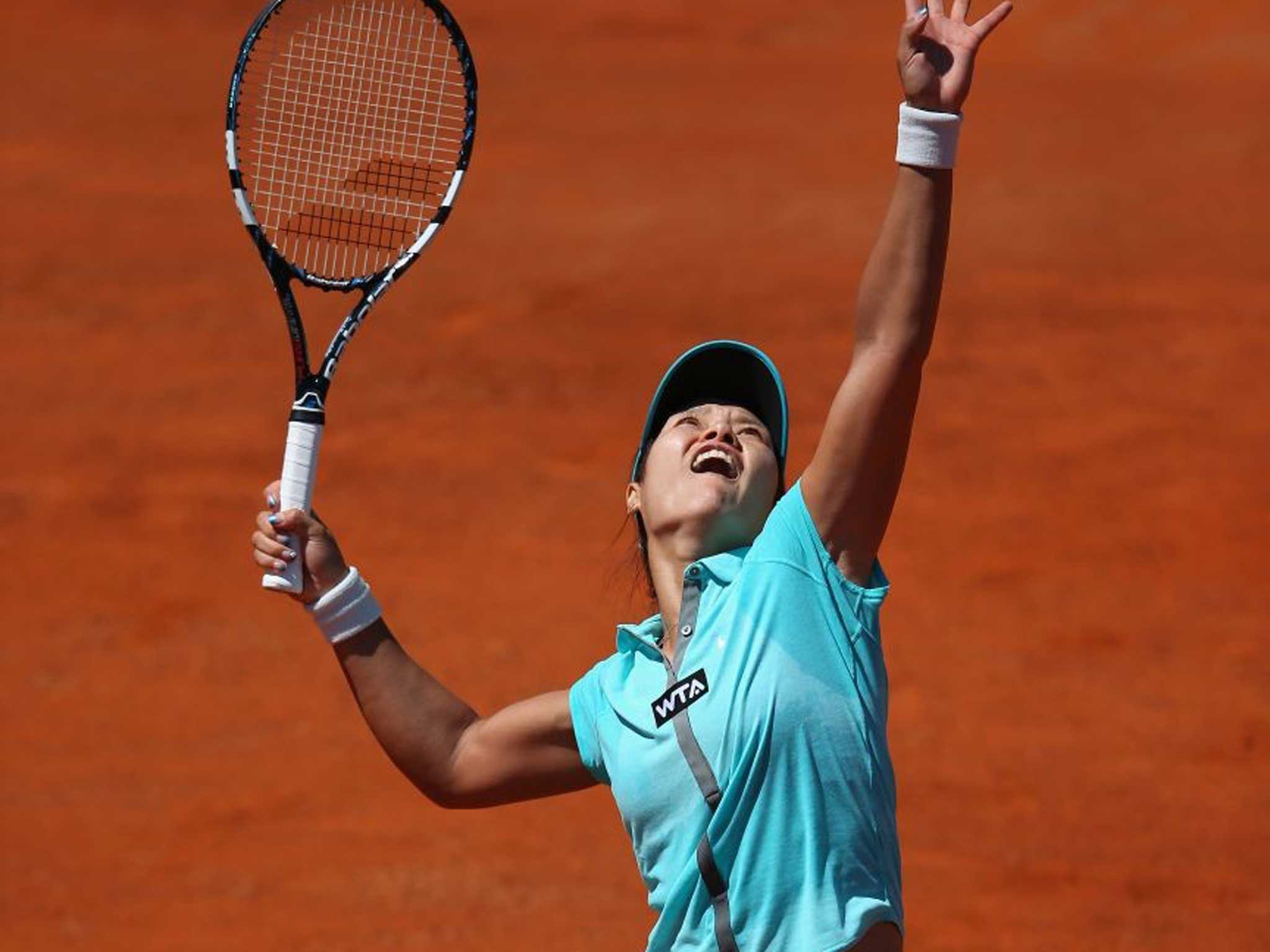French Open 2014: Li Na eyes the big prize in Paris
The world No 2 has a spring in her step to repeat 2011 triumph at Roland Garros

Nine of the top 10 people on Forbes magazine's list of China's most famous celebrities are actors, actresses or singers. Li Na, who is the exception, is listed as an athlete, but even away from the court the world No 2 women's tennis player is a great entertainer.
Li's cheeky sense of humour captivated the Melbourne crowd's imagination when she won this year's Australian Open – at the presentation ceremony she told her husband he was "so lucky to find me" and thanked her agent "for making me rich" – and has endeared her to the Chinese public.
One of her nicknames back home translates as "Big Sister Na", though 32-year-old Li does not approve. She explained: "Sometimes even grandfathers say: 'Hey, Big Sister!' I was like: 'Hey, I'm still young.' I met one very nice guy who was about 60. He said: 'Hey, Big Sister! I was watching you play when I was growing up!' I was like: 'Excuse me?' I couldn't really say anything. I just said to him: 'Thank you for supporting me'."
Li, who will go into this week's French Open as one of the favourites, has been a key factor in the remarkable rise of tennis in China, which was largely ignored in the world's most populous nation until it returned to the Olympics in Seoul in 1988.
The Women's Tennis Association now has an office in Beijing, while in the last five years the number of WTA tournaments staged in China has risen from two to eight. One of the additions to the 2014 calendar is the Wuhan Open in Li's home city. China also stages three tournaments on the men's tour, including the Shanghai Masters. The sport has recently been introduced into the country's schools and tennis courts have become a regular feature of new housing projects.
"Tennis in China has grown up, but we still have a lot more to do to improve," Li said. "Tennis in Europe or America has more than 100 years of history behind it. In China tennis is pretty young."
With annual earnings estimated in 2013 at $18.2m (about £10.8m), of which only $3.2m (£1.9m) was prize money, Li is ranked third on Forbes' list of the world's highest-earning sportswomen behind two other tennis players, Maria Sharapova ($29m) and Serena Williams ($20.5m). Major multi-national companies see her as a way into the vast Chinese market. Her agent, Max Eisenbud, who also represents Sharapova and Britain's Laura Robson, has agreed lucrative deals with, among others, Mercedes, Samsung, Rolex and Nike.
With more than 23 million followers on the Chinese microblogging website Weibo, does the world No 2 feel weighed down by the weight of expectation when she plays in China? Li, who became the first Asian player to win a Grand Slam singles title with her triumph here three years ago, said: "I used to feel a lot of pressure. I like to play in my home country, but at the same time I was also a little bit worried. Now I enjoy it more."
Li gave up tennis in her early twenties in frustration at the insistence of Chinese authorities that she concentrate on doubles (where it was thought the prospect of Olympic success was more likely). Her boyfriend, who became her husband, persuaded her to give the sport another go in 2004 and she has prospered ever since her national federation gave players a freer rein.
When did Li first believe she could become a Grand Slam champion? "I think it was only when I got to the Australian Open final in 2011," she said. "When I lost the final [to Kim Clijsters] I was standing there and I looked across at the trophy. I thought: 'You are really close. You really have a chance to make it'."
Williams and Li, No 1 and No 2 in the world respectively, are both 32. "Tennis has changed a bit," Li said. "It's not just about technique. You have to stay stronger. And as you get older you get more experienced. When I come to the court now I know exactly what I should do. I take more care of myself away from the court. I know what's good for my recovery, I'm careful with what I eat."
Li has also prospered under the coaching of Carlos Rodriguez, who enjoyed so much success with Justine Henin. "He's pushed me harder than anyone," Li said. "I remember after our first winter training session I felt like I was dying. I said to Carlos: Do you know how old I am? I feel like this programme is for someone who is 13 years old, not 30.'
"But the most important work he has done is with my mind. He has made me stronger. Before I used to play well at times, but badly at others. Now I try to keep at the same level from the beginning to the end."
Join our commenting forum
Join thought-provoking conversations, follow other Independent readers and see their replies
Comments
Bookmark popover
Removed from bookmarks